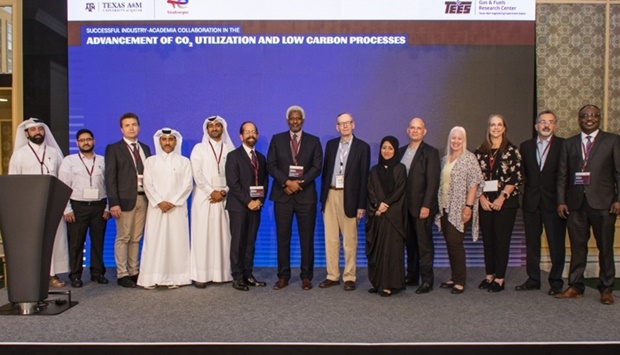The workshop marked the culmination of a six-year international collaborative research project led by Texas A&M at Qatar’s Gas and Fuels Research Centre (GFRC), and was attended by representatives from partner academic and industrial institutions in Qatar and worldwide.
During the opening of the event, Dr Cesar Octavio Malave, dean, Texas A&M University at Qatar said, “Qatar is the gas processing capital of the world, and this project represents a unique academic and industry partnership that has not only advanced Qatar’s leadership role in natural gas processing but could transform the industry worldwide. We are proud to partner with our friends at TotalEnergies and our academic collaborators in Qatar and the United States in this revolutionary research.”
The project, “Design of Novel Catalysts and Processes for Carbon Dioxide (CO2) Conversion from Micro- to Macroscale,” was funded by the Qatar National Research Fund as a National Priorities Research Programme (NPRP), and was conducted jointly with TotalEnergies Research Centers in Qatar and Belgium, as well as Northwestern University.

HE Dr Mohammed Bin Saleh al-Sada, chairman, Texas A&M University at Qatar Joint Advisory Board participated in the workshop
It sought to develop new catalysts and novel technologies that scale the conversion of CO2 into value-added chemicals and clean fuels, which could significantly impact gas processing technology and CO2 conversion, not only in Qatar but worldwide.
Yousef al-Jaber, director, TotalEnergies Research Center Qatar (TRC-Q) and vice president (Innovation and Change Management) at TotalEnergies Qatar commented said, “TotalEnergies collaboration with Texas A&M University Qatar, Northwestern University, and Qatar Foundation was primarily to explore cutting-edge technologies to address the climate change challenges, thus contributing towards the sustainability of this planet”
“The NPRP programme was the right vehicle to help and support us in this journey and we thank Qatar Foundation and Qatar National Research Fund for their support toward our joint research, and our Company’s Sustainable Development Targets”, Yousef continued.
During the workshop, the research team explained their innovation, which includes several novel processes that could help Qatar process its wealth of natural gas while reducing the country’s carbon footprint.
One example is the CARGEN reactor technology, believed to be the first of its kind, that processes natural gas (methane) and captured carbon dioxide (CO2) to produce both syngas, a valuable precursor to numerous hydrocarbon feedstocks that drive Qatar’s economy, and high-quality solid carbon nanotubes.
These high-quality carbon nanotubes can be used in several industries in Qatar, including steel and cement, while the syngas can be turned into ultra-clean fuels and value-added products.
The processes developed can be driven by either electric or solar power, eliminating the need to burn fuel and thereby resulting in much lower CO2 emissions than conventional technologies.
This project was led by GFRC director and Texas A&M at Qatar professor Dr Nimir Elbashir, in collaboration with faculty from Texas A&M University at Qatar, Texas A&M – College Station, and involves building the infrastructure necessary to support large-scale processes and catalyst synthesis in Qatar.
“We have developed innovative technologies that could be of great importance worldwide in terms of decarbonisation of natural gas processing plants in the energy sector, and which could benefit other sectors as well.
“This is a good example of how academia and industry could effectively collaborate to build a sustainable ecosystem to help tackle the climate change challenge in the years to come”“, said El Bashir.
GFRC’s world-class research facilities and expertise — both in Qatar and in the US at Texas A&M’s main campus — supported this project.
Along the way, Elbashir said, “the research has helped build human capacity in Qatar by training highly skilled scientists and engineers to lead the country’s future in gas processing technology”.

